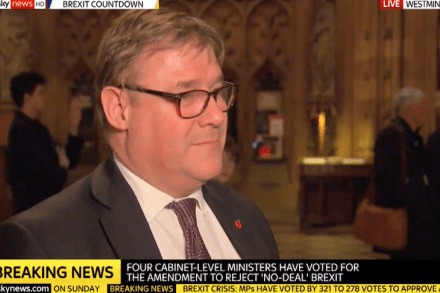Mark Francois: I was in the army, I wasn’t trained to lose
Following the government’s defeat on a motion ruling out no deal, Brexiteer MPs in the Tory party will be asking themselves one key question this evening: if Brexit might not happen at all, should I support May’s deal? The issue already appears to have split some of the Brexiteers in parliament, with MPs such as former Brexit secretary David Davis swinging behind May’s agreement, while ERG chairman Steve Baker has said he’ll continue to vote it down. One parliamentarian who doesn’t like he’s going to budge though is Brexiteer and ERG member Mark Francois. Speaking to Sky news presenter Beth Rigby following the vote against no deal, Francois was asked:




















